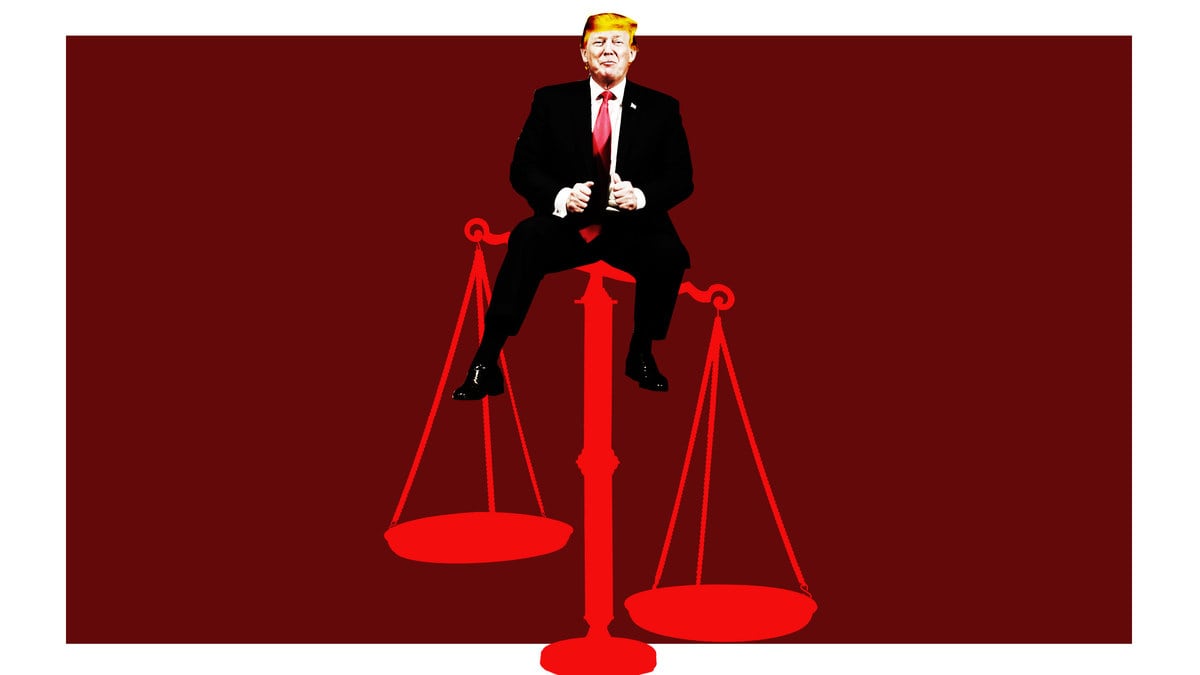In the midst of a deadly pandemic, Donald Trump has expanded his war on oversight by attacking the governments’ inspectors general, compounding the damage already done by his unprecedented stonewalling of congressional oversight investigations.
He’s brought back 29-year-old loyalist John McEntee, his former bodyman who was pushed out of the White House by then Chief of Staff John Kelly, reportedly over a gambling problem and tax issues that kept him from getting a security clearance, and the two are now targeting IGs as part of a broader effort to purge officials who aren’t sufficiently personally loyal to Trump.
That effort might help Trump delay any formal reviews of his failed leadership during the pandemic, or of his administrations’ disbursement of trillions in coronavirus-related spending, until after the November election.
Last week, Trump fired Michael Atkinson, the intelligence community inspector general, for his insistence on complying with an express statutory mandate to provide Congress with the whistleblower report detailing the president’s effort to coerce Ukraine to announce an investigation of Joe Biden. That followed Trump’s sidelining of, and attacks on, a number of government officials who objected to his Ukraine scheme, or just complied with congressional subpoenas, over the objection of Trump and his attorney general, William Barr. This week, Barr declared that Trump did the “right thing” by firing Atkinson because the IG had the audacity to inform Congress about Trump’s wrongdoing without receiving the president’s permission.
Initially, the Atkinson firing appeared to be the end of some old business, completing Trump’s grudge match against those who played roles in the disclosures that led to his impeachment. But on Tuesday, Trump broadened his attack, this time targeting an inspector general who was crucial to the congressionally mandated oversight of the Trump administration’s disbursement of trillions of dollars in coronavirus relief funds.
At the insistence of congressional Democrats, the recent $2.2 trillion “CARES Act” coronavirus relief bill included a provision requiring the establishment of a Pandemic Response Accountability Committee, which is intended to ensure review of the spending the statutory scheme leaves largely in the hands of Trump and Treasury Secretary Steven Mnuchin. The Obama administration was similarly subject to oversight in connection with its disbursement of TARP funds following the financial crisis.
Under the terms of the statute, Michael Horowitz, who is the chair of a council of inspectors general as well as the IG of the Department of Justice—and whom Trump has praised for his searching investigations of FBI FISA Court surveillance applications, including during the Russia investigation—was called upon to select the chair of the committee. Horowitz chose Glenn Fine, then delegated to serve as Defense Department IG, and a highly respected and non-partisan career government investigator. Immediately thereafter, however, Trump engaged in an audacious end-run by ending Fine’s service as acting DOD IG. Trump also named a White House lawyer to a key new special IG position charged with coordinating the work of the accountability committee. Additionally, in an echo of his absurd argument that Atkinson wrongfully shared the whistleblower report with Congress, Trump preemptively declared that a statutory provision calling upon the special IG to inform Congress if executive branch agencies unreasonably withhold certain information is somehow unconstitutional.
Trump has also loudly decried a report issued by a career deputy inspector general for the Department of Health and Human Services. The report details the dangers that hospital personnel have faced due to the chronic shortages of personal protective equipment. Trump has not offered any cogent factual rebuttal to the report. Instead he has suggested that the investigator was presumptively biased, simply because part of her career coincided with the Obama presidency. Trump has yet to fire that HHS deputy IG, but it may only be a matter of time until he does.
In the wake of Fine’s sidelining, Barr declared that Trump wants “responsible watchdogs.” As reported here, the firing and displacement of IGs is part-and-parcel of a broader White House “campaign to root out individuals perceived to be disloyal to Trump,” being overseen by McEntee, now back in the administration as head of the White House Presidential Personnel Office.
Trump’s attacks on the government’s IG infrastructure have been so audacious that they have raised questions among at least some GOP legislators. Senator Charles Grassley has questioned Trump’s dismissal of Atkinson, including because Trump end-ran a statutory requirement that Congress be provided with advance notice of the firing of an IG by placing Atkinson on immediate leave. And a bipartisan group of senators have formally demanded an explanation. But when, as can be expected, Trump offers no cogent explanation, it is doubtful that the GOP controlled body will pursue the matter further.
House Intelligence Committee Chairman Adam Schiff has announced plans to investigate Atkinson’s firing. House Speaker Nancy Pelosi has also indicated an intention to establish a select House committee to conduct oversight respecting the spending of CARES Act funds. But all such House investigations are inevitably time-consuming, and often delayed and derailed by political wrangling.
Additionally, Trump has taken a uniquely recalcitrant approach to congressional investigations. In the Ukraine matter, Trump defied long-standing precedent by refusing to voluntarily comply with nearly all congressional requests for information, and instructed current and former government officials to do the same. Furthermore, when Congress responded by issuing subpoenas, Trump, and officials following his instructions, defied the subpoenas as well. Then, when Trump’s defiance was challenged in court, in a case arising from a subpoena for the testimony of former White House Counsel Don McGahn, a panel of a federal appellate court decided that courts lack any authority to require current (or former) executive branch officials to comply with such subpoenas for testimony issued by Congress.
The McGahn case is now about to be reviewed by the full appellate court but even if the entire court decides that such subpoenas are enforceable, the issue is all but inevitably going to be heard by the Supreme Court. Additionally, a case seeking to force the Treasury Department to comply with an express statutory requirement to share Trump’s tax returns with Congress is being held in abeyance until the resolution of the McGahn case. In the meantime, we can expect that Trump will continue to defy any and all future congressional demands for potentially embarrassing information, including almost certainly any related to the IG dismissal and coronavirus oversight matters.
The exigencies of the ongoing national emergency are working in other ways to aid Trump in his stonewalling. The Supreme Court was scheduled to decide two other important cases regarding Trump’s amenability to congressional oversight and law enforcement investigations. In one of the cases, Trump is seeking to prevent financial institutions from complying with congressional subpoenas for his financial records; in the other case, Trump is seeking to bar compliance with the Manhattan District Attorney’s subpoenas for such materials in connection with a criminal investigation.
Until recently, it was expected that these key cases would be decided by June, but the pandemic has slowed the operation of the Supreme Court, which has yet to determine how it will hold arguments without risking the health of the Justices and lawyers. Accordingly, although the court faces heavy pressure to resolve the cases, it has now become possible that they may not be decided, or possibly even heard, until after the election.
In sum, it seems increasingly likely that Trump’s effort to stonewall and otherwise undermine institutional oversight of his own conduct, as well as that of the government officials that report to him, may well largely succeed, at least until after the election.
Even without the ability to force the president’s loyal soldiers to comply with congressional subpoenas, a small number of courageous truth tellers were willing to come forward to tell the truth about Trump’s Ukraine misconduct.
Similarly, Trump’s efforts to fully obfuscate and deny the catastrophic nature of his response to the pandemic do appear to be failing.
Journalists, health-care workers, and state and local officials are seeking to ensure that many of the critical facts come to light. Hopefully, their efforts to inform the public will continue to bear fruit, and Trump will not succeed in hiding the truth. It is crucial that, when voters go to the ballot box (or mailbox) in November, the scope of Trump’s catastrophic failure is known, even if all of the relevant information has yet to be exposed.







